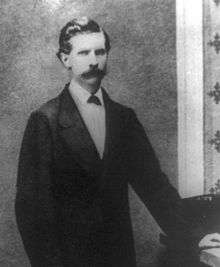John Gould Stephenson
John Gould Stephenson (March 1, 1828 – November 11, 1883)[1] was an American physician and soldier. He was the fifth Librarian of the United States Congress from 1861 to 1864. He was referred to as the "librarian of the Civil War era" because Stephenson's tenure of librarianship covered almost the entire length of the war.[2]
John Gould Stephenson | |
|---|---|
 John Gould Stephenson | |
| 5th Librarian of Congress | |
| In office May 21, 1861 – December 31, 1864 | |
| President | Abraham Lincoln |
| Preceded by | John Silva Meehan |
| Succeeded by | Ainsworth Rand Spofford |
| Personal details | |
| Born | March 1, 1828 Lancaster, New Hampshire |
| Died | November 11, 1883 (aged 55) Washington, D.C. |
| Nationality | American |
| Alma mater | New Hampshire Medical Institution Castleton Medical College |
| Known for | Librarian of Congress |
Biography
Stephenson was born in Lancaster, New Hampshire to Ruben Stephenson and his wife Mary King Baker. As an adult, he wanted to pursue a medical education.[2] After training at the New Hampshire Medical Institution and Castleton Medical College, he moved to Terre Haute, Indiana and became active in Republican Party politics. He was among the first faculty members at Vigo Collegiate Institute.
Stephenson was a staunch abolitionist and supported the election of Abraham Lincoln during his failed senatorial campaign against Democrat Stephen A. Douglas in 1858. Two years later, Stephenson delivered speeches in support Lincoln when he ran for president as a Republican.[2] Upon his election,[2] President Abraham Lincoln appointed him to the post of Librarian of Congress, replacing John Silva Meehan. The historical record is unclear why a physician sought appointment to this post.[3]
Stephenson spent most of his time serving as a Colonel in the Union Army during the Civil War, first with the 19th Indiana Regiment and later with the Army of the Potomac, participating in the Battles of Fitzhugh Crossing, Chancellorsville, and Gettysburg. He distinguished himself by rallying troops and volunteering his services as a general's aide.[2]
His most significant act was appointing Ainsworth Rand Spofford as Chief Assistant Librarian. Spofford would later become Librarian himself and was responsible for the transition of the Library from Congressional resource to national institution.[4] During his tenure Stephenson may have prevented a fire from destroying the Library of Congress. The library was forced to house bakeries to make bread for Union troops stationed in the District of Columbia. Stephenson took his complaint directly to President Lincoln and convinced him to remove the bakeries.[2]
Following his resignation in 1864, Stephenson fell into obscurity[2] as he held several political jobs, including medical reviewer at the Pension Office.
References
- "John Gould Stephenson (1828 - 1883)". findagrave.com. Retrieved 4 March 2016.
- Nappo, Christian A. (2016). The Librarians of Congress. New York, NY: Rowman and Littlefield. ISBN 978-1-4422-6260-7.
- "John G. Stephenson". Library of Congress.
- Cole, John Y. (March 30, 2006). "Jefferson's Legacy: A Brief History of the Library of Congress -- Librarians of Congress". Library of Congress. Retrieved 15 December 2008.
